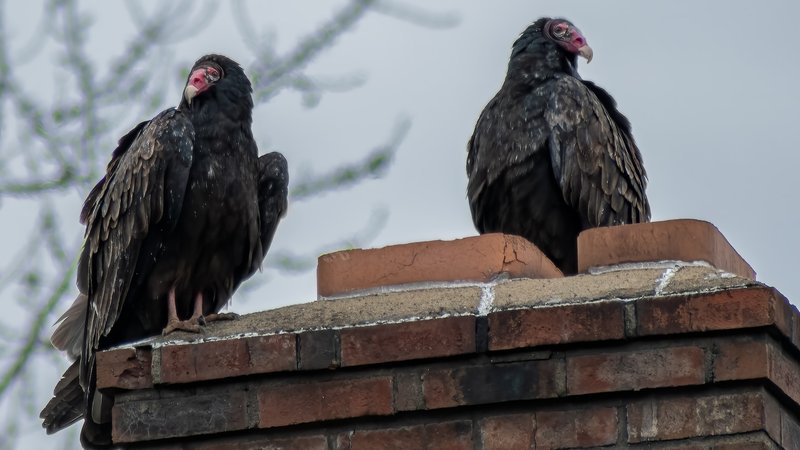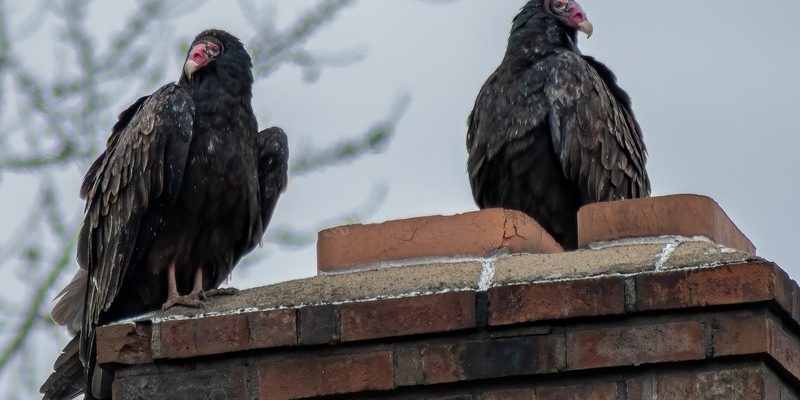
Turkey vultures are nature’s clean-up crew. They play an essential role in the ecosystem by consuming dead animals that others might shy away from. Think of them as nature’s recyclers. However, their somewhat eerie reputation can lead people to wonder if they’re more than just harmless cleanup artists. So, whether you’re an avid birdwatcher or simply curious, understanding the behavior of turkey vultures can help ease your mind about their presence.
Understanding Turkey Vultures
Turkey vultures are large birds that can be found throughout the Americas. Their wingspan can reach up to six feet, making them quite a sight against the sky. With their distinctive black and brown feathers, bald red heads, and keen sense of smell, turkey vultures are well-equipped for their scavenging lifestyle. They have a unique characteristic: while many birds rely on sight to find food, turkey vultures can actually smell the gases emitted by decaying animals. This gives them an edge in locating their next meal.
These birds are typically seen soaring high in the sky, often gliding effortlessly on warm thermals. They have a slow, graceful flight that can seem almost relaxed, which is fitting for their scavenger lifestyle. Despite their intimidating appearance, turkey vultures are generally non-aggressive and prefer to avoid confrontation. It’s really quite remarkable how such a large bird can be so at ease in its environment.
You might also notice that turkey vultures usually travel in groups. They tend to roost together and often feed in pairs or small groups, which lowers the individual risk of running into predators. This communal behavior is another fascinating aspect of their social structure, showing that they rely on their companions in the wild.
What Makes Turkey Vultures Non-Aggressive?
One of the most reassuring facts about turkey vultures is that they are *not* known to attack humans. Their diet consists solely of carrion, meaning they eat dead animals rather than hunting live prey. This scavenging nature stems from their digestive system, which is specially adapted to handle bacteria and toxins found in decomposing flesh. In fact, their stomach acid is so strong that it neutralizes harmful pathogens, making them less susceptible to diseases that might affect other animals.
If you encounter a turkey vulture, you typically don’t need to worry. They’re more interested in finding their next meal than causing trouble for anyone nearby. If threatened, their usual tactics are to puff themselves up, hiss, or even vomit as a defense mechanism. Sounds gross, right? But these behaviors are designed to distract predators or threats rather than engage in a fight.
Interestingly, their bald heads serve a purpose, too. While it may seem like an unattractive feature, this adaptation helps them stay clean while feeding. Since they often dive into carcasses, having feathers around their heads would lead to a mess. Their baldness makes it easier for them to stay hygienic and reduces the risk of infections that could arise from bacteria.
Can They Carry Diseases?
It’s natural to wonder if the turkey vulture’s diet exposes them to diseases that could affect humans. The truth is, while they can carry certain bacteria like *Salmonella* or *E. coli*, the risk of transmission to humans is quite low. Most diseases that affect vultures are specific to the species or are efficiently managed by their robust immune systems.
In other words, unless you’re directly handling a turkey vulture or its droppings, the chances of contracting something harmful are minimal. It’s similar to how many animals can carry diseases without them being a direct threat to us. Just as you wouldn’t catch a cold from a raccoon you spotted from afar, turkey vultures are not a significant danger for disease transmission.
Moreover, these birds play a vital role in controlling the spread of disease within ecosystems. By consuming dead animals, they help prevent outbreaks that could occur if carcasses were left to decompose without nature’s recyclers stepping in. So, rather than viewing turkey vultures as a threat, it’s better to appreciate the essential role they play in maintaining a healthy environment.
When Are Turkey Vultures Aggressive?
While turkey vultures are generally docile, there are situations where they might display aggressive behavior. These instances are often tied to protecting nests or young birds during breeding season. Like many animals, when they feel threatened, their protective instincts kick in. A defending parent might hiss or spread its wings wide to assert dominance over any nearby perceived threats.
If you stumble upon a turkey vulture’s nest, it’s best to keep your distance. Just imagine a mother bird ready to defend her chicks; they’ll do what it takes to protect their little ones. However, these situations are rare and typically occur away from human-populated areas.
It’s also important to note that although turkey vultures can seem intimidating, they rarely, if ever, attack. Their primary mode of survival is to avoid confrontation and stick to their scavenging habits. So, if you’re hiking in an area where turkey vultures are nesting, just give them space, and they’ll likely steer clear of you, too.
Myths and Misunderstandings about Turkey Vultures
With any animal that has a somewhat grim reputation, there are bound to be myths. One common misconception is that turkey vultures are harmful or aggressive creatures. As we’ve discussed, this isn’t true. They are not out to get humans and rarely pose any threat unless provoked.
Another myth suggests that turkey vultures will attack live animals or humans. This again is far from reality. Their role as scavengers means they’re focused on finding food that is already deceased. They’ve adapted to avoid hunting for live prey, which isn’t part of their lifestyle. Their sharp beaks are designed for tearing apart carrion, not attacking.
You might also hear people say that vultures can smell fear. While that’s a fun idea, turkey vultures actually rely on their exceptional sense of smell to locate food. They aren’t motivated by the emotions of other creatures. So, if you’re feeling a bit uneasy about a vulture’s presence, rest easy; they’re simply searching for their next meal.
Final Thoughts on Turkey Vultures
In conclusion, turkey vultures are not dangerous to humans. They are primarily scavengers, playing a vital role in our ecosystems by consuming carrion. While they may appear unsettling to some, understanding their behavior and attributes reveals a different story. Rather than fear, it’s better to approach these birds with appreciation for their unique place in nature.
Recognizing that turkey vultures are more interested in avoiding confrontation than picking a fight can help you feel more relaxed if you encounter them. So next time you see one soaring overhead or perched on a fence post, take a moment to appreciate this remarkable bird. They are essential to keeping our environment healthy, and their presence can remind us of the delicate balance in nature.

